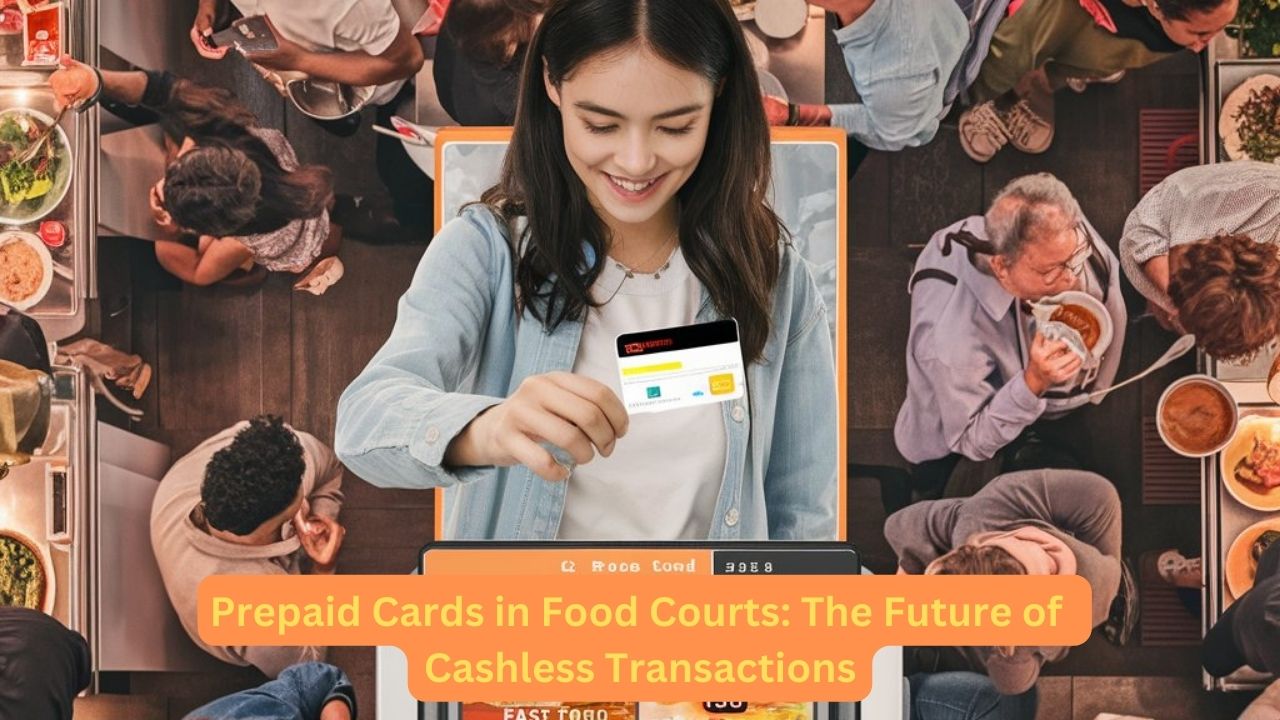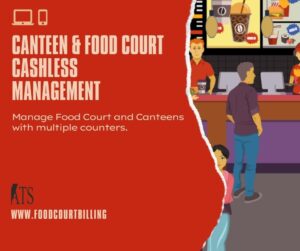Discover why Prepaid Cards in Food Courts are becoming the go-to payment method.Learn about the benefits, how they work, and the top providers in the industry.
In recent years, the food industry has undergone a significant transformation, with cashless transactions becoming increasingly popular. Food courts, in particular, have embraced this trend, with prepaid cards emerging as the preferred payment method. In this article, we’ll explore the reasons why prepaid cards are the new normal in cashless food court transactions and how they benefit both consumers and food court operators.
What are Prepaid Cards?
Prepaid cards are a type of payment card that allows users to load a specific amount of money onto the card, which can then be used to make purchases at participating merchants. Unlike traditional credit or debit cards, prepaid cards do not require a credit check or a bank account. They are also not linked to a user’s personal information, making them a more secure payment option.
The Rise of Cashless Food Court Transactions
Cashless transactions have been on the rise in recent years, with more and more consumers opting for the convenience and security of digital payments. The food industry, in particular, has been quick to adopt this trend, with many restaurants and food courts now offering cashless payment options.
There are several reasons why cashless transactions have become so popular in food courts. For one, they are faster and more efficient than traditional cash transactions, which can be especially important in a busy food court environment. Cashless transactions also eliminate the need for food court operators to handle and manage large amounts of cash, which can be time-consuming and costly.
Why Prepaid Cards are the Preferred Payment Method in Food Courts
While there are several cashless payment options available, prepaid cards have emerged as the preferred payment method in food courts. There are several reasons for this:
Convenience
Prepaid cards are incredibly convenient, allowing users to load money onto the card and then use it to make purchases at participating merchants. This eliminates the need to carry cash or worry about having enough money on hand to make a purchase.
Security
Prepaid cards are a more secure payment option than traditional cash or credit cards. They are not linked to a user’s personal information, which means that even if the card is lost or stolen, the user’s information is still safe. Prepaid cards also eliminate the need for food court operators to handle and manage large amounts of cash, which can be a security risk.
Budgeting
Prepaid cards are an excellent budgeting tool, allowing users to load a specific amount of money onto the card and then stick to that budget. This can be especially useful in a food court environment, where it can be easy to overspend.
Rewards and Incentives
Many prepaid card providers offer rewards and incentives to users, such as cashback or discounts at participating merchants. This can be a significant advantage for consumers, who can save money on their food court purchases.
The Benefits of Prepaid Cards for Food Court Operators
Prepaid cards are not just beneficial for consumers; they also offer several advantages for food court operators.
Increased Sales
Prepaid cards can help to increase sales in food courts. By offering a convenient and secure payment option, food court operators can attract more customers and encourage them to make more purchases.
Improved Efficiency
Cashless transactions are faster and more efficient than traditional cash transactions, which can be especially important in a busy food court environment. Prepaid cards, in particular, are incredibly efficient, as they eliminate the need for users to fumble around with cash or wait for a credit card transaction to process.
Reduced Costs
Cashless transactions can also help to reduce costs for food court operators. By eliminating the need to handle and manage large amounts of cash, food court operators can save time and money.
Another benefit of prepaid cards is that they can help to reduce waste and improve sustainability in food courts. By allowing customers to pre-load their cards with a set amount of money, food court operators can encourage them to only purchase what they need, rather than overestimating and leaving behind uneaten food. Additionally, prepaid cards can be used to incentivize customers to bring their own reusable cups, containers, and utensils, further reducing the environmental impact of food court transactions.
While prepaid cards offer many benefits, it’s important for food court operators to be aware of the potential drawbacks and challenges. For example, some customers may be hesitant to adopt a new payment method or may not have access to the necessary technology, such as a smartphone or computer. Additionally, prepaid cards may be subject to fees and restrictions, such as expiration dates and minimum balance requirements, which can be confusing or frustrating for customers.
How Prepaid Cards are Benefiting Food Court Operators
Prepaid cards are not only benefiting customers but also food court operators. However, it’s essential for food court operators to to stay up-to-date with the latest trends and technologies to ensure they are providing their customers with the best possible experience. This means not only offering a range of cashless payment options but also investing in the necessary infrastructure to support these transactions, such as high-speed internet and mobile payment terminals.
In addition to offering convenience and security, prepaid cards also have the potential to help food court operators better understand their customers’ behavior and preferences. By analyzing data on prepaid card transactions, food court operators can gain insights into which foods and drinks are the most popular, which times of day are the busiest, and which promotions and discounts are the most effective. This information can then be used to optimize menus, staffing levels, and marketing strategies, ultimately leading to increased sales and profits.
Increased Sales
Prepaid cards can help food court operators increase their sales, as customers are more likely to make a purchase if they have a prepaid card. This is especially true for customers who do not have cash or a debit or credit card on hand. Prepaid cards can also encourage customers to make repeat purchases, as they can reload their card with funds as needed.
Improved Efficiency
Prepaid cards can also help food court operators improve their efficiency, as they can process transactions faster and more efficiently. This can help reduce wait times and improve the overall customer experience. Prepaid cards can also help food court operators manage their inventory, as they can track the sales of prepaid cards and adjust their inventory accordingly.
Types of Prepaid Cards
There are several types of prepaid cards that can be used in food courts, including:
Open-Loop Prepaid Cards
Open-loop prepaid cards can be used at any merchant that accepts them, just like a debit or credit card. They are issued by banks or other financial institutions and can be reloaded with funds as needed. Examples of open-loop prepaid cards include Visa, Mastercard, and American Express prepaid cards.
Closed-Loop Prepaid Cards
Closed-loop prepaid cards can only be used at a specific merchant or group of merchants. They are issued by the merchant or a third-party provider and can be reloaded with funds as needed. Examples of closed-loop prepaid cards include Starbucks prepaid cards and gift cards.
Virtual Prepaid Cards
Virtual prepaid cards are digital payment cards that can be used to make online or contactless payments. They can be reloaded with funds as needed and can be used at any merchant that accepts them. Examples of virtual prepaid cards include Google Pay and Apple Pay.
Choosing the Right Prepaid Card for Your Food Court
When choosing a prepaid card for your food court, there are several factors to consider, including:
Ease of Use
Choose a prepaid card that is easy to use and understand. Customers should be able to quickly and easily tap or swipe their card to make a purchase.
Fees
Consider the fees associated with the prepaid card, including activation fees, reload fees, and maintenance fees. Choose a card with low or no fees to make it more attractive to customers.
Branding
Consider the branding of the prepaid card, as it can help promote your food court and attract more customers. Choose a card that is visually appealing and easy to recognize.
The Future of Cashless Food Court Transactions
Cashless transactions are likely to continue to be a significant trend in the food industry, with prepaid cards emerging as the preferred payment method in food courts. As technology continues to evolve, we can expect to see even more innovative payment options in the future, such as mobile payments and biometric authentication.
Another benefit of prepaid cards is that they can help to reduce waste and improve sustainability in food courts. By allowing customers to pre-load their cards with a set amount of money, food court operators can encourage them to only purchase what they need, rather than overestimating and leaving behind uneaten food. Additionally, prepaid cards can be used to incentivize customers to bring their own reusable cups, containers, and utensils, further reducing the environmental impact of food court transactions.
While prepaid cards offer many benefits, it’s important for food court operators to be aware of the potential drawbacks and challenges. For example, some customers may be hesitant to adopt a new payment method or may not have access to the necessary technology, such as a smartphone or computer. Additionally, prepaid cards may be subject to fees and restrictions, such as expiration dates and minimum balance requirements, which can be confusing or frustrating for customers.
To ensure a successful transition to prepaid cards in cashless food court transactions, food court operators should take a customer-centric approach, prioritizing convenience, security, and transparency. This means offering a range of payment options, including prepaid cards, and clearly communicating the benefits and potential drawbacks of each. It also means investing in user-friendly technology, such as mobile payment apps and self-service kiosks, and providing adequate training and support for both customers and staff.
Conclusion
In conclusion, prepaid cards are increasingly becoming the new normal in cashless food court transactions, offering a range of benefits for both customers and operators. By prioritizing convenience, security, and sustainability, food court operators can leverage prepaid cards to optimize their operations, improve the customer experience, and ultimately drive growth and success.
For more information on cashless payment solutions and food court management, check out the following resources:
- Food Court Billing – a leading provider of cashless payment solutions and food court management software.
- Advance Technology Systems – a software development and product selling company that offers a range of technology solutions for businesses.
- Labhak – an online marketplace that offers a range of prepaid cards and other payment solutions.
FAQs
Q: What are the benefits of using prepaid cards in food courts?
A: Prepaid cards offer a convenient, cashless payment option that can help customers budget their spending and reduce the risk of theft or loss.
Q: Are prepaid cards accepted at all food court vendors?
A: It depends on the food court and the specific prepaid card. It’s best to check with the food court management or the card issuer to confirm acceptance.
Q: Can I reload my prepaid card at the food court?
A: Some food courts may offer prepaid card reloading kiosks or allow vendors to reload cards. It’s best to check with the food court management or the card issuer for options.
Q: Are there any fees associated with using prepaid cards in food courts?
A: It depends on the specific prepaid card. Some cards may have purchase, reloading, or maintenance fees. It’s best to check with the card issuer for details.
Q: How do I know the balance on my prepaid card?
A: Most prepaid cards offer options to check the balance, such as online or mobile account access, automated phone systems, or text message alerts. It’s best to check with the card issuer for options.
We hope you enjoyed reading our blog posts about food court billing solutions. If you want to learn more about how we can help you manage your food court business, please visit our website here. We are always happy to hear from you and answer any questions you may have.You can reach us by phone at +91 9810078010 or by email at ats.fnb@gmail.com. Thank you for your interest in our services.




